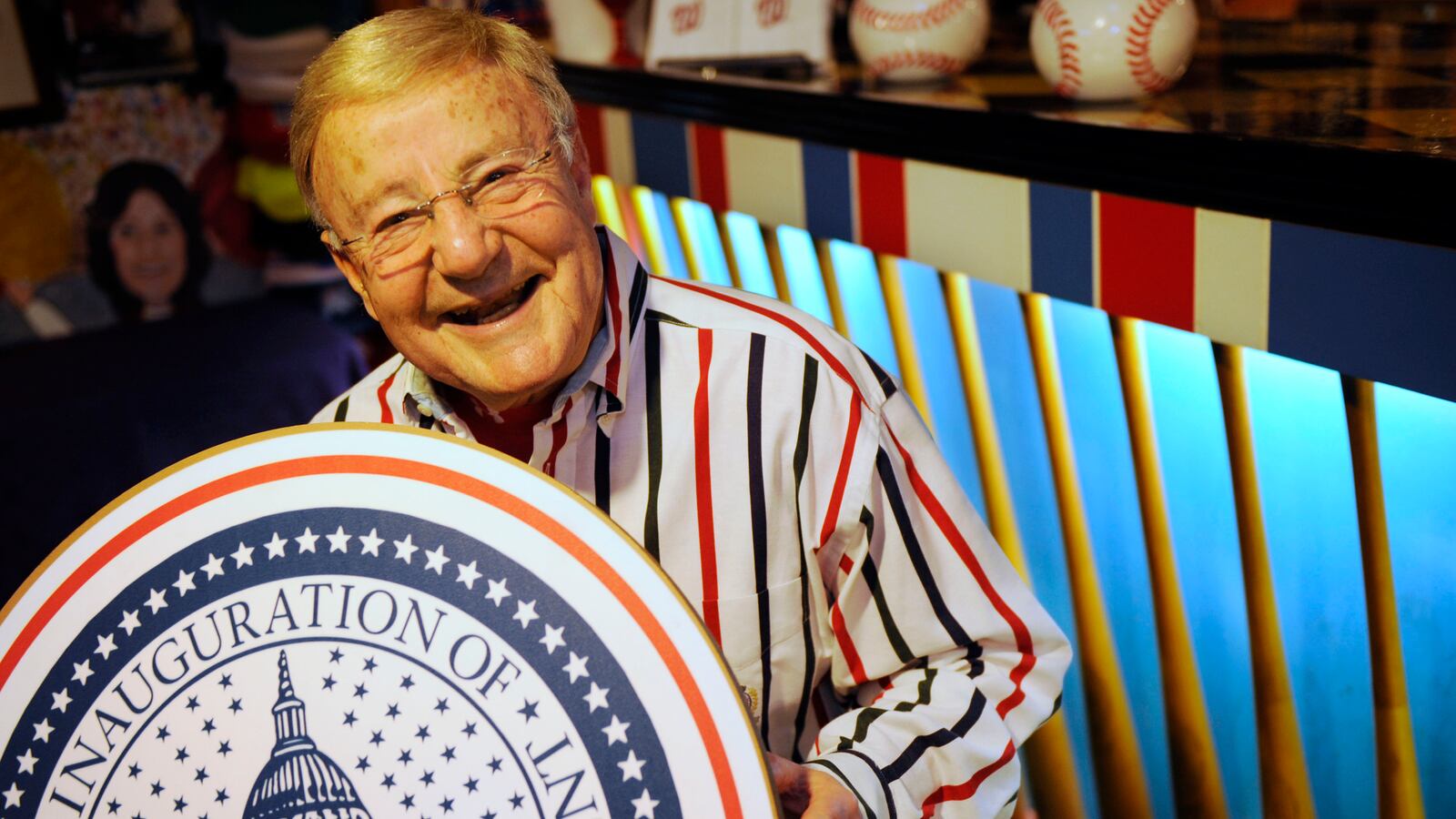In the past 63 years—through rain, sleet, snow, and bone-chilling cold—there have been 15 inaugural parades. But in all that time, there has been only one presidential announcer.

Charlie Brotman, a gregarious and loquacious 85-year-old, began his voluntary stint announcing Harry Truman’s inauguration in 1949, and he will be back on his perch atop the glass-enclosed media complex directly across from the White House for Barack Obama’s second inauguration on Jan. 21.
Brotman’s job is to talk, a task at which he excels—to describe the bands and floats that wend their way up Pennsylvania Avenue to salute the commander in chief, and to kibbitz with the throng to fill up down time.
One exceptionally cold year, he invited the crowd to do the wave. Almost everyone within earshot joined in.
“I am the eyes and ears of the president. He can’t see what’s coming—I can,” Brotman says over breakfast at the Mayflower Hotel, one of his favorite hangouts. “I’m the luckiest guy in the world. Every time they ask me what my fee is, and I say, ‘It’s nothing, a patriotic contribution.’ It’s like the first time every time—what an honor.”
Nattily attired in a spiffy black suit and shirt topped with a jaunty pink-and-black-striped tie, the spry native Washingtonian rummages through a briefcase containing a profusion of presidential memorabilia conjuring up the past.
He was 22 and a student at the National Academy of Broadcasters when, thanks to his enthusiasm and his mellifluous voice, he was picked, along with several others, to broadcast the first nationally televised inaugural parade. He sat for hours in an open booth, pelted by the elements, but he found the experience exhilarating. He was hooked.
He went on to an announcer’s job with baseball's then Washington Senators and several other sports teams, founded a successful public-relations firm, where he still consults, and along the way became a well-known, popular Washington figure.
In 1956, at the request of President Dwight Eisenhower, whom he had introduced at a ballgame, he was dubbed the official President’s Announcer and has never relinquished his microphone.
Armed with a thermos of hot tea, Brotman begins his Inauguration Day duties around 9 a.m., when he checks his script and begins welcoming the crowds. He has stayed on the job as late as 8 p.m., standing the entire time, a feat he credits to “pure adrenalin.”
“I am chatting, welcoming, informing, entertaining,” he says. “I’ll do a trivia contest with the people. I’ll try to do some ad-libbing, because these people have been there several hours and it’s freezing and I’m trying to comfort them.”
For Brotman, this is his moment of glory, and to ensure attention he spaces his comments 15 minutes on, 15 minutes off, adding historical tidbits to his spiel as he goes along—e.g., the first organized inaugural parade took place in 1809 at the swearing in of James Madison.
Weather has played havoc twice.
A blizzard paralyzed the capital during John F. Kennedy’s inauguration. And arctic air forced Ronald Reagan’s second celebration indoors.
“I got a call at 2 a.m. telling me we’re going inside with only a couple of high-school bands. They told me to forget the script because I was going to have to ad-lib everything. ‘The president will be there, you’ll be there, and we’ll get it done.’ We did,” he says. “It only took an hour. Most take four hours plus.”
His only brush with disaster involved a direct comment to George W. Bush during a lengthy lull in the 2005 parade. On air he asked the president, a baseball fan, if he planned to throw the first ball at the Washington Nationals game in April.
Bush shrugged and threw up his arms.
Minutes later the Secret Service arrived and warned him never to address the president with a statement or question again. “I was terrified. I thought they were going to throw me in jail. Then I realized you can’t tell the world where the president is going to be tomorrow or the next day.”
Despite the faux pas, Bush invited him to the White House to emcee a handicapped kids’ baseball game. Bush recalled the incident from Inauguration Day and put his arm around Brotman while posing for a joint picture.
He has photos of—or with—most of the 11 presidents he has worked for, including a surprising one from Richard Nixon, who, in a rare moment of informality, signed a picture “Dick Nixon” instead of the usual Richard.
Two presidents stand out for him: Reagan and Bill Clinton. “They were the most outgoing personalities,” he says. “Clinton and I were facing each other at a sports dinner, he grabs me by the shoulder and turns me around to face the photographer, shaking hands with him. I thought that was really thoughtful of him to do that.”
He has learned that the president’s personality dictates what kind of parade it will be. “If it’s an Eisenhower, if it’s a Carter, it’s conservative. Somebody like Kennedy and Reagan—they brought half of Hollywood in, it was show biz, entertainment, top hat.”
He has not yet met Obama, but believes, and hopes, that an introduction is in the works.
There have been several strategy sessions and lunches with the current Presidential Inaugural Committee staff, and he is prepped and psyched for his coming performance.
“This is very, very special to me. I am an ordinary guy in an extraordinary situation, so I look forward to it. I would be heartbroken if they said, ‘We don’t need you anymore.’”






